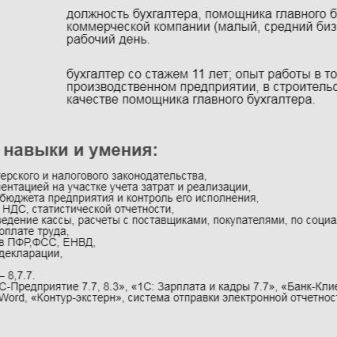Desired position in resume

The desired position in the resume is an item that can cross out the most brilliant career expectations. Recruiters point out that even a rudimentary study of other people's mistakes before writing your own application can significantly increase the chances of success. When deciding what to do, if you do not know which vacancy is best to apply for, it is worth considering examples posted by other applicants.
Even if the job list suggests different options or a combination of professions, the main criterion for the employer is the confidence of the future employee in their abilities in a particular profession.
How to specify the desired vacancy correctly?
Sometimes only submitting a resume can separate you from your dream job. It is important that the desired position matches the professional skills of the specialist. There is an ironclad rule here: there is only 1 resume per vacancy. Trying to demonstrate the breadth of your knowledge, you can find yourself outside the labor market. In addition, there are other mistakes that the applicant is better off avoiding.
When planning to write a resume for the first time, it is worthwhile to first study the available samples, to understand the rules for its preparation. The main recommendation here is only one: you need to put the title of the position instead of the title. That is, you need to start not with the inscription "resume" at the top of the document, but with the designation of the position for which the applicant decided to apply. According to recruiters, “I don’t know what to choose” options show the immaturity of the person who wants to get a job.

Presenting your skills to an employer is the second step to getting a vacant position. When reviewing resumes, recruiters are primarily looking for specialists interested in a particular position. Accordingly, when recruiting personnel, those who apply for different positions are immediately eliminated. Putting a list of your expectations in the title part of your resume, you may not wait for proposals at all.
You can avoid mistakes if you take a responsible approach to self-presentation. To correctly fill out the first part of the resume, it is worthwhile from the very beginning to act according to a certain scheme.
- Precisely define your qualifications, professional skills. This will allow you to understand how high expectations can be. Having a specialized education in which there is no experience can be as important as practical work in a specialty with the study of the necessary skills on the spot.
- Determine the range of vacancies you are interested in. For each option, its own resume is drawn up. It is better if there are no more than 2-3 priority options. On many job search services, recruiters can view a list of all user applications. You should not spray your area of interest from the CEO position to searching for a courier or office manager vacancy.
- Prepare a resume. After the name of the vacancy, you should indicate practical skills in the chosen field, work experience, and your competitive advantages. You should not overload the resume with details, it is better to pay maximum attention to the completeness and correctness of contact information. You can tell about yourself in more detail at the interview.
By following the rules, you can significantly increase your chances of success during the initial selection stage. It is only important to avoid critical mistakes in the resume, which will immediately lead to a refusal to cooperate with the applicant.

Section writing errors
It is not enough to put a beautiful title of the position in the resume, it is also important to correctly formulate its name, determine the profile of the vacancy, and present yourself correctly. It is worth considering the most common errors in more detail.
Empty graph
The worst mistake is to submit a resume without specifying the desired position at all. A large company can open dozens of vacancies in different profiles. HR staff will not tailor existing positions to suit a specific job seeker. Lack of information about which position interests a specialist is the first sign of a non-professional attitude to work.
Copy of work book
It seems that the simplest option would be to rewrite the data on the position held from the work book. The wording in it differs markedly from the commonly used ones, here the categories and specializations are indicated, narrowing the range of search. It is better to abandon bureaucratic practices and translate the dry language of recruiters into a more familiar plane.
Having correctly formed the name of the vacancy, you can significantly expand the list of companies that will be ready to offer a job to the applicant.

Confusion in definitions
When specifying the name of the vacancy in the resume it must not be confused with the industry in which the work is to be carried out. For example, “business administration” or “marketing”, “sales” is a prime example of incorrect wording. The substitution of concepts often applies to impersonal definitions: "employee of the sales area", "boss", "employee". The title of the position in the resume should sound like this: "marketer", "administrator", "salesman-cashier".
Unfinished education
The main mistake of students when specifying the desired position in the resume is to provide information about incomplete education instead of the name of the vacancy. This is just the status that a person occupies in the hierarchy of the company. Such a column in the resume will definitely not bring benefits, but you can indicate the course and specialty in the section on education. If you have practical knowledge or real work experience, you can indicate it, but with the addition of "trainee" or "trainee".
Multitasking
Job seekers often believe that it is worth listing absolutely their entire life path and work biography on a resume. The employer only wants to get at his disposal a conscientious employee corresponding to the vacancy... It is worth specifying several skills at the same time only if they are of a related nature. For example, "salesperson", "cashier", "sales representative". Having a list of unrelated positions may scare off a potential employer.

Lack of specifics
Do not devalue yourself from the very beginning. Mentioning about agreeing to take on any job, a potential employee prevents himself from getting it. A person without ambition and a specific position in the resume can rely solely on low-paying offers or one-time part-time jobs. Companies will not seriously consider his candidacy.
Too wide coverage
Even having indicated the position correctly, do not forget about the specifics. The indication "manager" does not reveal the real skills of the specialists. The addition of "sales", "personnel", "customer service" is the first step to success. The programmer should decorate the line in the resume with the languages with which he works.
Examples of
If the desired specialty is not immediately indicated, the resume may pass by the attention of the specialist in charge of recruiting. For example, by specifying three specialties at once in different areas of responsibility, you can gain a reputation as a person who is not able to hold on to any position for a long time. The job seeker who knows the wholesale and retail sales looks much more impressive.
It is imperative to choose the correct wording. This will allow you to get advantages over competitors already at the selection stage. It is especially important that this data be placed in the "header" - the heading. Then you can tell in detail about your own experience.
Such a resume will look much more informative and attractive than a template version, even filled out in accordance with all the rules.










